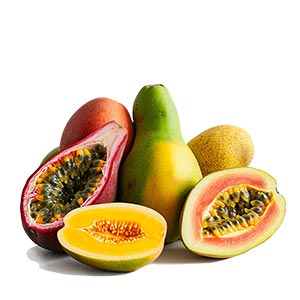Exotic Fruits in perfumery refers to a broad range of unusual and often tropical fruits that are not commonly found in everyday markets. These fruits, such as dragon fruit, lychee, passion fruit, guava, and mangosteen, are celebrated for their unique and captivating aromas.Historically, the use of exotic fruits in fragrances has been a way to invoke a sense of adventure, luxury, and the allure of the unknown. These scents often transport the wearer to distant lands and exotic locales, embodying the essence of exploration and discovery.In fragrance compositions, exotic fruits add a burst of sweetness, tanginess, and a lush, tropical feel. They are often used to create a sense of freshness and vibrancy in a perfume, making the fragrance feel alive and dynamic. The sweet and sometimes tart characteristics of these fruits can introduce an element of surprise and excitement to a fragrance, breaking the monotony of traditional scent profiles.The incorporation of exotic fruits in perfumes is also a reflection of the growing global palette and the increasing consumer desire for new, unique scent experiences. As the world becomes more connected, the interest in diverse and unconventional ingredients grows, making exotic fruits a popular choice among perfumers who wish to craft modern, worldly, and enticing fragrances.
Natural or Synthetic?
Exotic fruits are used in both natural and synthetic forms in fragrances due to their diverse nature and the challenges in sourcing and extracting their scents. While natural extracts and oils of some exotic fruits can be obtained, they often require specific climatic conditions to grow and can be costly to produce. Synthetic versions are developed to replicate these scents more economically and consistently, offering flexibility in fragrance design.
Fragrance Families Exotic Fruits Most Commonly Found In
Show fragrances that contain Exotic Fruits as a note


